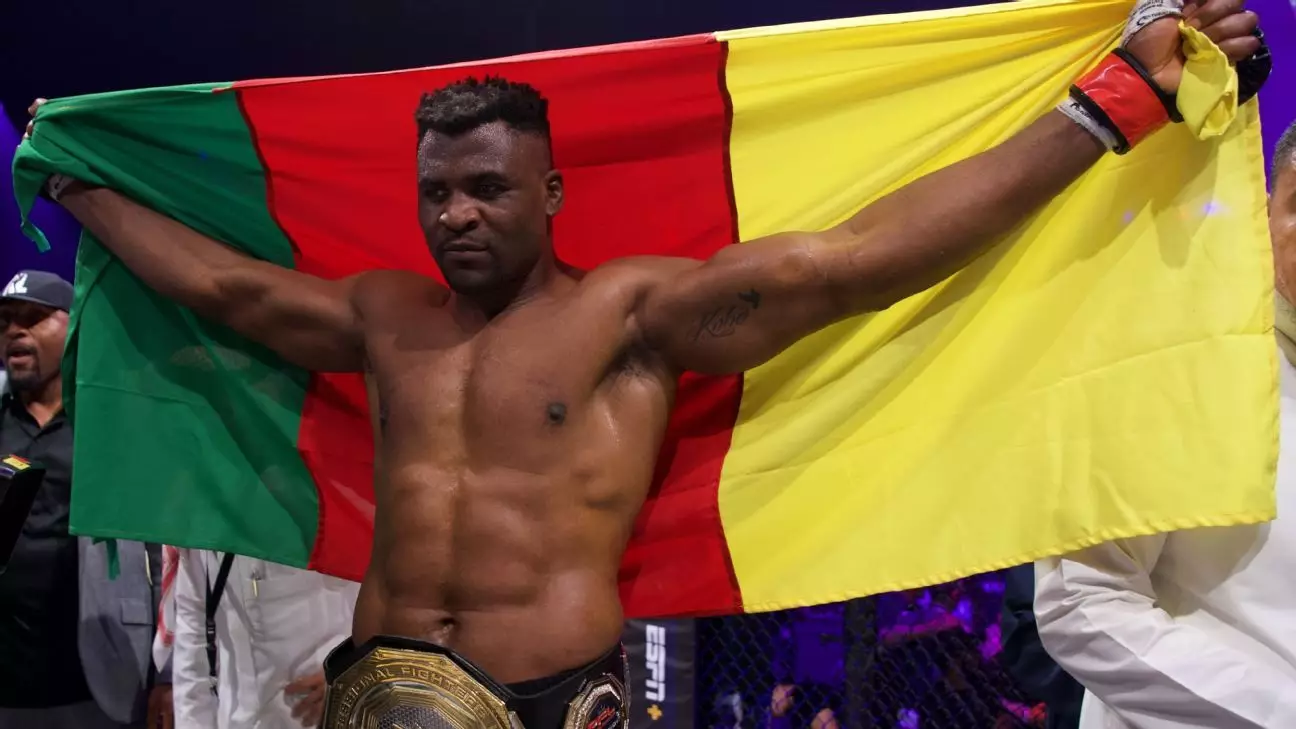In the world of mixed martial arts (MMA), few fighters have a narrative as compelling as that of Francis Ngannou. Recently, Ngannou returned to MMA after a tumultuous period that included a harrowing detour into boxing and personal tragedy—the loss of his 15-month-old son. This emotional backdrop sets the stage for Ngannou’s significant victory over PFL heavyweight champion Renan Ferreira at PFL Super Fights in Abu Dhabi. However, rather than bask in the glory of his success, Ngannou finds himself embroiled in a bitter feud with UFC CEO Dana White. This tension raises pivotal questions about the dynamics of power within the combat sports arena and the ramifications of fighters’ decisions regarding their careers.
Ngannou’s remarks following his return highlight a tumultuous relationship with White. Ngannou claims that White has consistently manipulated narratives to undermine him, suggesting that the UFC executive is struggling to accept his departure from the organization. Ngannou stated, “Dana has lost in this situation… and he cannot stand it.” This accusation underscores a larger issue in professional sports, where the leaders of organizations often attempt to maintain control over public perception in the face of athlete autonomy. In Ngannou’s view, White’s ongoing remarks about him are a transparent attempt to distract from the UFC’s loss—both in terms of Ngannou’s talent and the implications of his move to the PFL.
White has asserted that Ngannou could have made more money had he remained with the UFC. However, Ngannou vehemently disputes this claim, arguing that his earnings through his boxing endeavors surpassed what he would have made in the UFC. The conversation around financial earnings is not merely a matter of figures; it reflects the larger power struggle between fighters seeking financial independence and organizations that often perpetuate restrictive contracts. Ngannou’s successful bouts against renowned boxing champions Tyson Fury and Anthony Joshua, despite his losses, illustrate that significant financial opportunities exist beyond the confines of UFC’s promotion.
Dana White’s dismissal of Ngannou’s accomplishments outside the UFC casts light on the organizational dynamics that characterize mixed martial arts. The narratives espoused by figures like White can shape public perception and influence the careers of fighters who dare to challenge the status quo. Ngannou’s critique that White is fabricating reasons for his continued conflict speaks to a broader pattern within the sport, where established figures often resist the emergence of competitors who threaten their influence.
Moreover, Ngannou’s insistence that the UFC owes him money serves as an illustration of the contractual complexities that can arise within such promotions. Fighters often face convoluted financial arrangements, and Ngannou’s experience is indicative of the struggle for transparency within the industry. Such claims also invite discussions about fighter compensation; an issue that remains a pressing concern in the world of sports, where earnings often do not equate to the risks taken inside the cage.
Despite the tensions with White, Ngannou remains keenly interested in a potential fight against Jon Jones, further complicating the narrative. Ngannou posits that both he and Jones are willing to engage in this match, but that Dana White is the primary obstacle. This assertion reveals the complexity of cross-promotion in MMA and the potential for mega-fights like this to remain unrealized due to egos and corporate interests.
The potential involvement of figures like Turki Alalshikh, Chairman of Saudi Arabia’s General Entertainment Authority, highlights an avenue through which such landmark events could come to fruition. His prior roles in financing significant fights and sponsorship deals suggest that the landscape of MMA could be evolving towards more inclusive and profitable arrangements, though this is contingent upon the cooperation of established promoters like White.
Francis Ngannou’s odyssey in and out of the UFC encapsulates the broader tensions within MMA, where the aspirations of fighters often clash with the ambitions of promotion executives. His challenges emphasize not just the individual struggle of one athlete, but the systemic issues that pervade the sport. Ngannou’s journey is emblematic of the pursuit for autonomy, financial success, and ultimately, the respect that many fighters seek in a world where their narratives are frequently dictated by others. As the future unfolds, the interactions between fighters, promoters, and global media will undoubtedly shape the trajectory of mixed martial arts, as both celebrated athletes and ambitious newcomers vie for their place in an evolving landscape.

